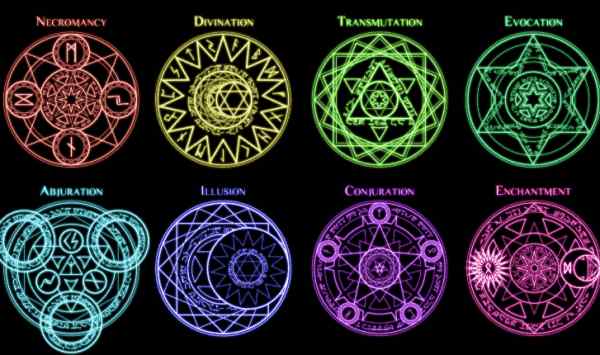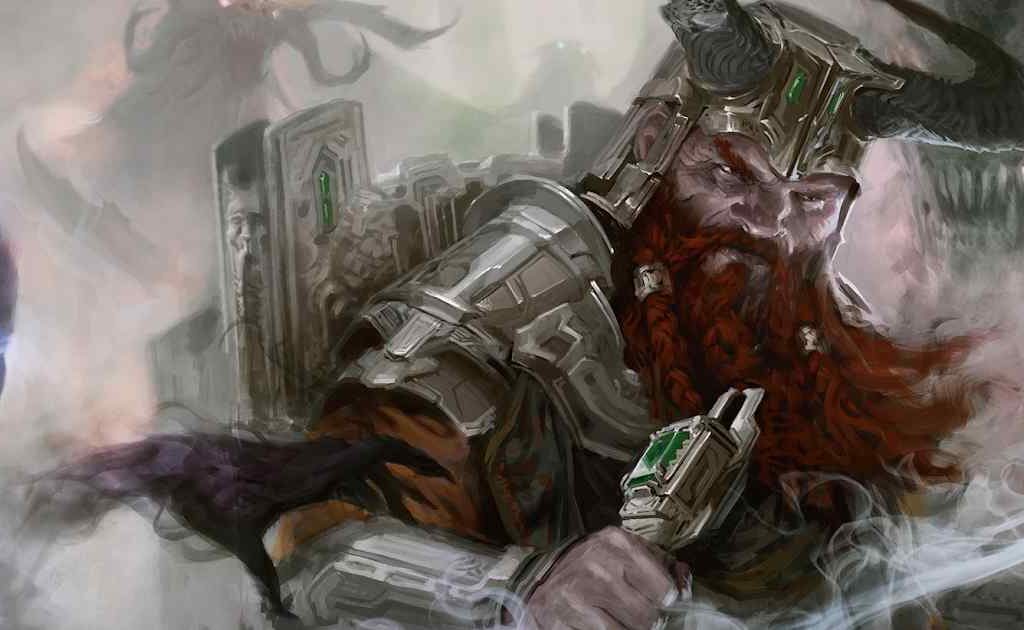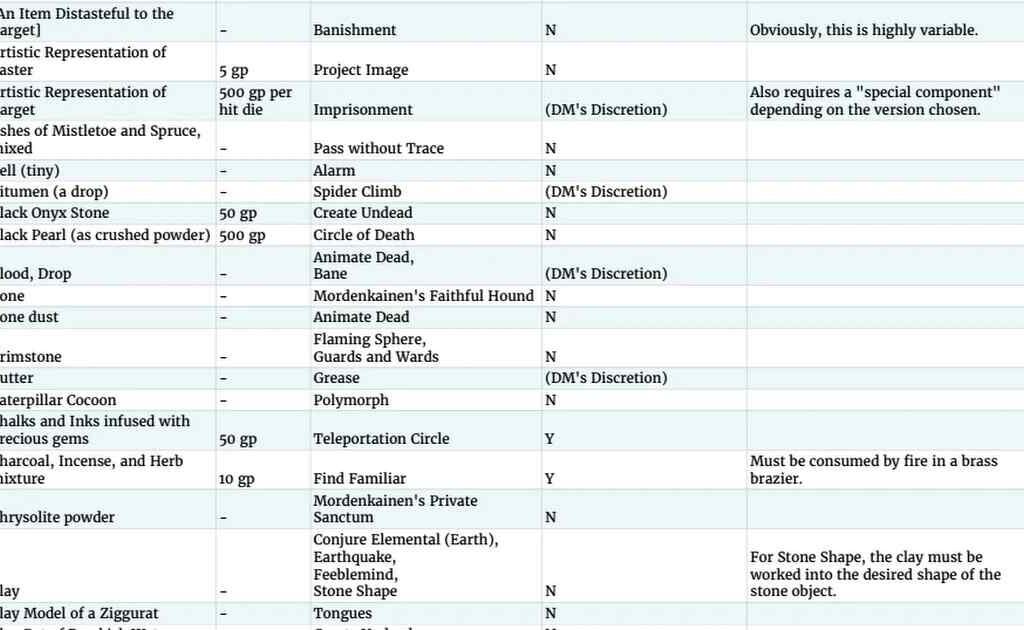Imagine yourself in the midst of an epic battle, surrounded by friends and foes alike. The clash of steel echoes through the air as your heart races with excitement and anticipation.
You extend your hand outwards, uttering mystical words while making precise gestures with your fingers. Suddenly, a brilliant bolt of lightning arcs from your fingertips, striking down those who would see you fall.
This is the power that awaits you when you delve into the world of spellcasting in Dungeons & Dragons (D&D).
As a magic-wielding adventurer in D&D, it’s essential to understand the components required for casting spells effectively. Spell components are what bring these incredible feats of arcane might to life and are part of what makes this role-playing game so captivatingly immersive.
In this article, we will explore the various types of spell components – verbal, somatic, and material – their roles within spellcasting mechanics, as well as discuss situations where some or all components may be missing or circumvented altogether.
Unleash your inner mage and discover how to harness the raw power that lies within these seemingly simple ingredients!
Key Takeaways
- Spell components in D&D consist of verbal, somatic, and material components, with nearly 70% of spells requiring some combination of these components.
- Collecting material components is a personal quest for growth, and missing components can cripple magical abilities, but alternative resources or alliances can help overcome this.
- Mastering spell components unlocks potential as a true wielder of magic, with verbal components allowing for channeling the power of voice and ancient words, and somatic components guiding the flow of arcane energy and manifesting will into reality.
- The art of spellcasting in D&D blends science and creativity, and every flick of the wrist or whispered incantation taps into a world of magic that offers limitless wonders. Role-playing in D&D spellcasting is a thrilling world of immersive role-playing that unlocks the potential to harness the raw power of spellcasting.
Spellcasting Basics in Dungeons & Dragons

In D&D, you’ve gotta master the spellcasting basics to unleash your magical prowess and keep your foes on their toes! Spellcasting is an art that blends science and creativity, giving you the power to bend reality at your whim.
With every flick of your wrist or whispered incantation, you can tap into a world of magic just waiting to be unleashed. But it’s not all about flashy tricks; it takes patience, practice, and knowledge to become a true spellcaster.
As you delve deeper into this fantastical realm, you’ll learn how to harness arcane energies and weave them into powerful spells that can heal allies, control elements, or even tear apart the very fabric of space-time itself!
So grab your wand (or staff), put on your thinking cap, and dive headfirst into the thrilling world of D&D spellcasting – where limitless wonders await those brave enough to seize them.
Types of Spell Components in D&D
You’ll be amazed to know that nearly 70% of all magical incantations in the game require some combination of verbal, somatic, and material components for casting.
These components act as the key to unlocking your inner spellcaster and unleashing the untapped power within you.
To give you a better understanding of these crucial elements, let’s break them down:
- Verbal Components: By speaking mystical words or phrases aloud with unmatched precision, you tap into the very essence of magic itself. Harnessing this ancient knowledge is akin to grasping at whispers from long-lost civilizations; it’s an exhilarating experience that empowers you beyond measure.
- Somatic Components: Through intricate gestures and precise movements, your body becomes a conduit for arcane energy. This physical expression allows you to shape raw magic into stunning displays of power, like a master sculptor working with intangible clay. The freedom found in these elegant motions provides an unbridled connection to the unseen forces around us.
- Material Components: Often overlooked but equally important, material components can range from simple items like feathers or sand to rare gemstones and enchanted relics. As a spellcaster, collecting these materials becomes a personal quest for growth as each component holds secrets waiting to be unlocked. The thrill of discovering new ingredients adds excitement and purpose to your journey through the world of Dungeons & Dragons.
By mastering these three types of spell components, you will gradually unlock your potential as a true wielder of magic – granting yourself unparalleled freedom in shaping your destiny within this wondrous realm.
The Role of Verbal Components in Spells

When it comes to casting magic, verbal components play a crucial role. They allow you to channel the power of your voice and ancient words into awe-inspiring feats.
As you breathe life into these mystical incantations, your voice becomes an instrument capable of shaping reality and granting you the freedom to bend the world around you to your will.
The very act of uttering these arcane phrases is like unlocking hidden doors within yourself, unleashing your creativity and potential in ways that go beyond imagination.
Embrace this gift of verbal components in spells, for they’re not just mere words; they’re the key to discovering uncharted territories within yourself and conquering boundaries that once seemed insurmountable.
Let your voice be heard, adventurer, and let it echo through time as a testament to your mastery over the magical arts.
Somatic Components in Spellcasting
As you weave your fingers through the air, intricate gestures and fluid movements become an essential aspect of spellcasting, guiding the flow of arcane energy and allowing you to harness its power with precision and grace.
Somatic components in spellcasting serve as a physical conduit for this magical force, manifesting your will into reality.
To master these somatic elements, consider the following four key principles:
- Understand the importance of dexterity: Your manual dexterity directly affects your ability to perform complex gestures with ease and accuracy.
- Practice makes perfect: Just like any other skill, honing your somatic abilities requires dedication and consistent practice.
- Incorporate bodily movement: Full-body motions are sometimes necessary to effectively complete a spell’s somatic component.
- Be mindful of constraints: Be aware that factors such as wearing heavy armor or being restrained may hinder or even prevent you from executing somatic components.
Embracing these principles will refine your magical prowess and set you free on a journey towards limitless possibilities in the fantastical world of D&D.
What Happens If A Component Is Missing?

If a crucial piece goes amiss, one’s magical abilities may find themselves crippled, diminishing the enchanting world of mystic wonders before them.
Without the necessary components for a spell, you’ll be left stranded like an adventurer lost in a labyrinth without their trusted map.
The arcane energies that once flowed effortlessly through your fingertips will suddenly feel restrained and inaccessible, leaving you feeling powerless and frustrated.
But fear not! As with every challenge life throws at us, there are always creative solutions to overcome these obstacles.
You may need to hunt down alternative resources or seek out hidden caches of magical ingredients to replenish your stockpile.
Even better, forge new alliances with fellow magic users who could lend you a helping hand in your time of need or share their knowledge on improvised substitutions for those elusive components.
Remember, magic is fluid and ever-changing; as long as you believe in yourself and stay resourceful, no missing component can keep your spirit shackled for long!
Can Spells Be Cast Without Components In D&D?
Curious about casting without the usual magical ingredients, are you? Well, in D&D, casting spells without components is possible under certain circumstances.
Some spells don’t require any components at all, while others need only verbal or somatic elements.
Additionally, suppose you’re a spellcaster with the Eschew Materials feat or using a focus item like an arcane focus or holy symbol. In that case, you can bypass many of the material requirements for your spells.
However, keep in mind that high-value materials and those consumed by the spell still need to be provided. So go ahead and embrace the freedom of casting spells unencumbered by mundane items – just remember there may still be some limitations on your magical prowess!






